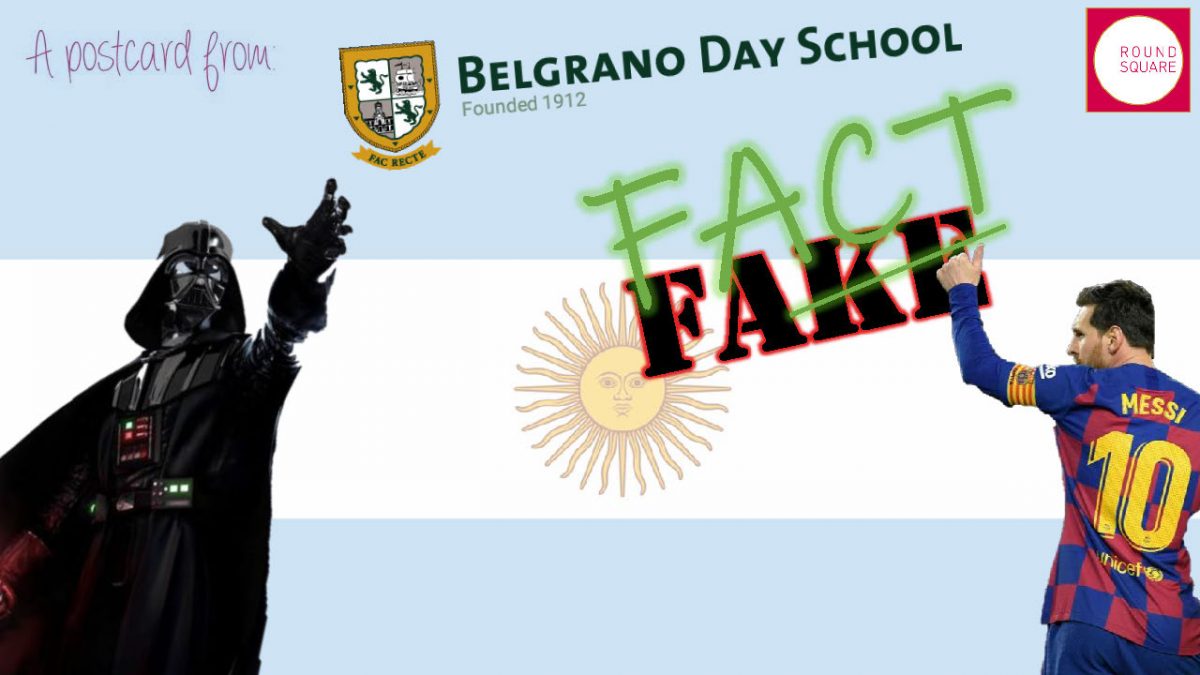A Postcard from Belgrano Day School: Fake News Collaboration Call
Posted: 01 July 2020

IDEALS
- Internationalism
- Democracy
- Leadership
Discoveries
- Communication skills
- Sense of responsibility
- Tenacity
- Courage
- Teamwork
- Inventiveness
Age range:
15 – 17
Curriculum area:
Global Education, digital literacy, and critical thinking
Lead school:
Belgrano Day School
Schools involved:
San Silvestre School, St. Clement’s School, Felsted School, Vidya Devi Jindal School, St. George’s College and Scotch Oakburn College.
Overview
As a part of the ‘Postcard Zooming around the world’ initiative that Round Square launched to keep schools connected during the pandemic, four students from Belgrano Day School in Argentina volunteered to lead a discussion around “fake news” and the need for young people to develop a critical mind around what they read on social media.
Planning
Our team leading on this collaboration was made up of the students who were due to attend various conferences this year, that had unfortunately had to be cancelled due to the global pandemic. So this was a wonderful opportunity for those students to still get a taste of international collaboration as well as enable them to step up as leaders and representatives for their school.
The first step in planning was to come up with a theme for the discussion: ‘The Dark Side of the News’ was suggested by the Global Education department and then discussed with the Head of Middle and Senior school. With increasing fake news around coronavirus and levels of reporting causing concern and confusion, children and young people may find it harder to separate fact from fiction. The goal of this theme was for students to think about the different means in which we receive fake news and be able to identify them. A second objective was to learn how to recognise trustworthy site’s characteristics and be mindful of the risks that lie behind this type of toxic and harmful journalism. Research has found that 70% of 8-17-year-olds recognise what they see online can be misleading – but only 33% find it easy to check if it is factually correct.
To help prepare all delegates for the discussion and to ensure that everyone had some base knowledge of fake news, we wanted to give them an article to read prior to the call. We selected an article called ‘Social Media Fuels Wave of Coronavirus Misinformation’ published on Snopes.com, a fact checking website.
Finally, we assigned specific roles to students who would be leading the call so they were all clear on what they would be doing, and we also rehearsed the call the day before with students from our own school.
Details
Our Zoom Call took place Wednesday 20th May at 4:30pm Argentinian time and we were joined by 35 students aged 15-18 and their teachers from seven different schools on fake news.
At the beginning of the call our students facilitating the session all introduced themselves to the audience and invited everyone to do likewise taking turns. This was a simple but effective icebreaker to open discussion and allow our leaders to gain their confidence.
Following this initial round, a definition of fake news was discussed among the participants by asking what words they associated with it. For this task, the delegation used the app Mentimeter which allowed them to create an interactive word-cloud that contained all the responses.
After that, everyone shared experiences in which they found themselves believing or re-posting fake news and discussed how fake news spreads and which are the most effected social media platforms circulating fake news.
Finally, delegates took part in a “fake or real” activity in which students had to identify fake news from a selection of news posts. Participants then discussed what the hazards of blindly sharing this type of information without fact checking them first.
Challenges
On the 19th March, Argentina entered a nation-wide lockdown and as a result have been operating as a school via distance learning. This posed our main challenge for organising this collaboration call, students and teachers were currently juggling their ‘new normal’ of online learning and trying to familiarise themselves with technology, manage screen time and busy timetables.
Yet, the teachers believed that this opportunity to lead an international discussion would bring about a positive change of routine for the students. Flexibility was the key to face all of these challenges, accept their limitations and finally fulfil their goals.
Impact
The students were very engaged with the activity and worked hard to do it in the best possible way. Having a chance to plan a virtual meeting – which they had never done before, proved to be a fantastic hands-on opportunity to for them to develop their digital literacy, planning abilities and their teamwork skills.
This collaboration allowed our students to develop key leadership, facilitation and communication skills including oratory, debating and being able to communicate confidently in English.
One of the main learning outcomes of the activity was that it gave the students an opportunity to develop their self-awareness and realise that there was “more in them than they knew”. The satisfaction of having accomplished their goal successfully was the prevailing feeling after the meeting and this also boosted their self-confidence.
We also hope that the subject matter helped all our delegates to develop a sense of self-awareness and stressed the importance of effective and positive communication. Being able to identify ‘fake news’ and encouraging them to pause before sharing, is one of the most effective ways of reducing the spread of toxic, a potentially dangerous miss information.
Long term outcomes
As usual within a school environment, one exciting activity opens the door to future ones and motivation has a domino effect on students and it passes on from one to another. This first experience as virtual hosts of an international gathering certainly sparked an interest among students and most of them are looking forward to future chances to repeat it and even engage their friends to join them. We are looking into new possibilities that might offer students valuable opportunities for experiential learning and a deeper dive into international understanding.
Advice
- Let students take the lead and develop a sense of ownership over the project. Teachers should just be guides and promoters of the student’s confidence.
- Choose a subject that students can easily connect and engage with. Ideally, let them pick it so you make sure they are comfortable with the subject matter.
- Run a rehearsal so that students familiarize themselves with the leading role and can get an idea of what to expect.
- Be mindful of time differences and choose a time that is friendly for as many countries as possible. In this kind of international experiences, diversity is a major plus.
Author: Daniela Ajzenszlos, Global Ed Coordinator, Belgrano Day School
